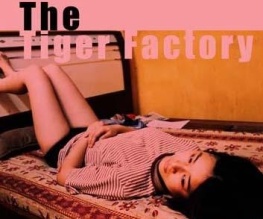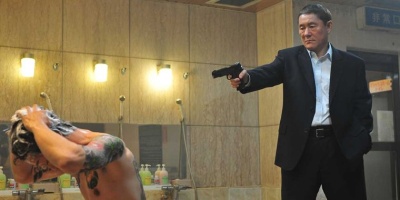The Tiger Factory

Woo Ming Jin’s beautiful neo-realist film follows a young girl, Ping Ping (Lai), desperate to save up enough money so that she can be smuggled to Japan and start a better life. The first shot of Ping Ping, and indeed of the film, reveals a youthful, pretty face; she appears little more than a girl. As the camera pulls back we see that she is heavily pregnant, and on her way to work in a pig farm where she is responsible for collecting the pigs’ sperm for artificial insemination. Ping Ping’s baby, we discover, has been conceived in order to be sold through her aunt’s baby-selling business. It appears that Ping Ping is messing with the natural order of things in more ways than one.
Ping Ping lives with her friend Mei in a room that, while tiny, is well kept. Ping Ping is under the guardianship of her aunt, Madam Tien (Pearlly Chua), who makes her work two jobs even while heavily pregnant. After washing dishes at a grubby restaurant, she is picked up and taken to the pig farm – hardly the best conditions in which to harvest a baby. Because that’s what Madam Tien, and Ping Ping, are doing. The creation of life is reduced to a commercial process, a business enterprise; even the pigs’ procreation is used to turn a profit. Each new life is a commodity that can be bought and sold. In Madam Tien’s business, baby boys earn twice as much money as girls, but even if the baby is stillborn the surrogate mother earns a small fee.
Madam Tien’s baby business is run in a seedy apartment, where a man is selected to try to impregnate each girl. It is an unsentimental process, purely a business transaction. In this environment, Ping Ping begins to form a relationship with the man who she ‘sees’ most often, a Burmese man called Kang (Rum Nun Chung). He is considerate towards her, and while the circumstances in which they meet may be bizarre and slightly creepy, their friendship is touching, blossoming in the most unlikely of places.

Ping Ping’s scenes with Kang are the only few times we see Ping Ping smile. Throughout most of the film, Ping Ping’s facial expressions remain calm and composed. Fooi Mun Lai’s beautiful face appears almost serene amid the hopelessness of her situation. She is resigned to this life and to the methods she has to resort to in order to get what she wants.
Woo Ming Jin favours visual expression over exposition and heavy dialogue, but no shot is wasted. He is economical in his editing but manages to let scenes breathe, so one never feels he is rushing through his narrative. He lets the actors breathe, letting them find their rhythm and play the scenes as naturalistically as possible. Lai Fooi Mun’s performance is particularly assured, conveying the vulnerability of many girls in this situation, but remaining strong throughout.
In the end The Tiger Factory is a rather uplifting tale about a young girl who is forced to rely on herself because she has no real support system. In this world, pig sperm plus foetuses equals money, and that’s not a world in which any of us would want to live.
Reviewed as part of the Geneva Black Movie Festival



Recent Comments